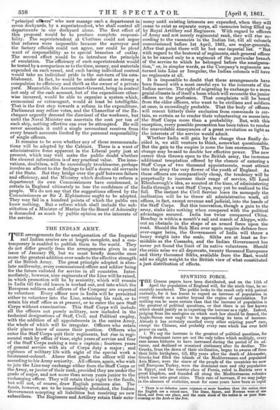THE INDIAN ARMY. nomy until existing interests are expended, when
they will cease to exist as separate corps, all vacancies being filled up by Royal Artillery and Engineers. With regard to officers of Army and not merely regimental rank, they will rise ac- cording to the vacancies in the Indian list, till all colonels commissioned before 1st April, 1861, are major-generals. After that point there will be but one imperial list. "Bat with regard to the bestowal of regiments, each general officer is to be named only to a regiment of the particular branch of the service to which he belonged before the amalgama- tion," or, in simpler words, as the Company's regiments are turned into Line or Irregular, the Indian colonels will have no regiments at all.
It is impossible to doubt that these arrangements have been framed with a most careful eye to the interests of the Indian service. The right of migrating by exchange to a more genial climate is of itself a boon which will reconcile the junior officers to the profession. That complaints will be heard from the older officers, who want to be civilians and soldiers at once, is exceedingly probable. That the body of officers will resent bitterly their exclusion from commands is cer- tain, so certain as to render their volunteering en Inane into the Staff Corps more than a probability. But, with this exception, every possible precaution has been taken to render the unavoidable annoyances of a great revolution as light as the interests of the service would admit.
Whether India will gain by the change thus finally de- cided is, we still venture to think, somewhat questionable. But the gain to the empire is none the less enormous. The change may be said to double her effective power. The new career thus thrown open to the British army, the immense additional temptation offered by the chance of entering a Staff Corps of two thousand appointments, must attract into the army the very flower of the youth of England. As these officers are comparatively cheap, the tendency will be perpetually to increase their range of service, till Lord Ellenborough's idea, so scouted at the time, of administering India through a vast Staff Corps, may yet be realized to the full. The instant the Civil Service loses its monopoly the inclination will be to throw all administrative work, all offices, in fact, except revenue and judicial, into the hands of the Staff Corps. But this innovation, though a gain to the army, sinks into nothing when compared with the political advantages secured. India has twice conquered China. Bombay is within a month's sail and march of Aleppo, with- out an obstacle in the shape of an armed force upon the road. Should the Sick Man ever again require defence from over-eager heirs, the Government of India will throw a heavy weight into the scale. Sikhs are at least as for- midable as the Cossacks, and the Indian Government has never yet found the limit of its native volunteers. Should the crisis arise we all deprecate, twenty thousand Europeans and thirty thousand Sikhs, available from the East, would add no slight weight to the British view of what constituted a just distribution of effects.






























 Previous page
Previous page